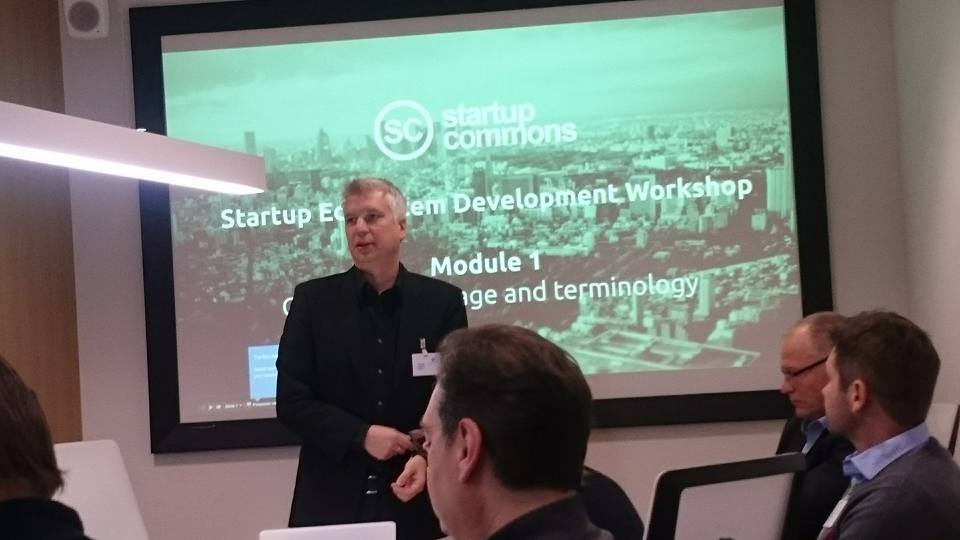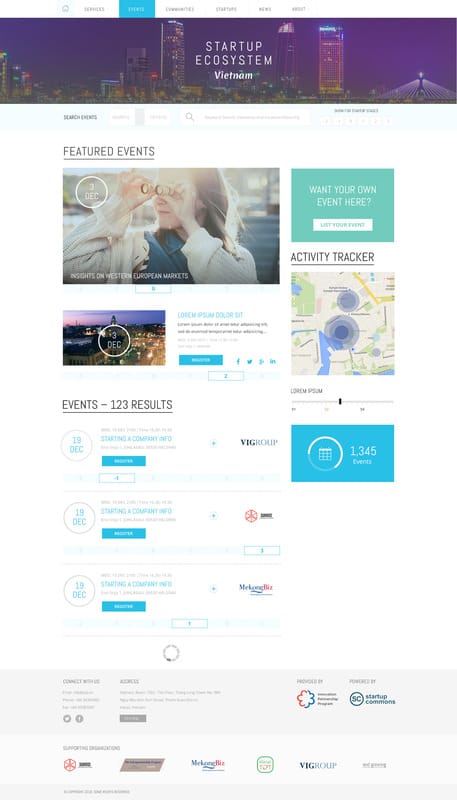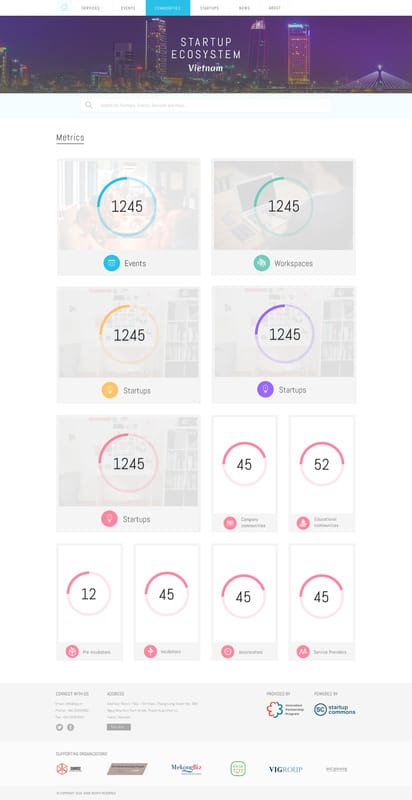|
After hosting the Startup Ecosystem Development workshop and receiving positive feedback from our guests, we would like to share with our readers the knowledge and success stories we gathered from presenters and visitors. The workshop was a one-day event during SLUSH festival in Helsinki, it attracted interest on global scale: the guests came from 9 countries in Europe, South America and Asia and various business areas, including policy makers, platforms and API developers, professional services, multinational corporation and startup communities (incubators, accelerators and hackathons). The idea behind hosting such workshop was to introduce key stakeholders to ecosystem development framework that helps in targeting various activities and measuring the impact of these activities, and also assist in better understanding the relations between different areas. Despite having limited time to cover such a vast concept, the workshop speakers from Startup Commons and Resolute HQ introduced guests to Ecosystem Development process from the ground up:
To showcase practical applications of the theory, we had several inspiring presentations from the companies already working (and succeeding) in this space:
Additionally, big number of practical materials and tools were provided during and after the workshop. We would also like to say thanks to our esteemed partners – EY and University of Helsinki / Think Company for their excellent assistance during the workshop, as well as for City of Helsinki, Head of Unit, Tommo Koivusalo for the kind words and encouragement for shared efforts that systematic development of vibrant Startup Ecosystems requires. The video streaming was not provided at the event, but we highly recommend to watch this video of Valto Loikkanen presenting at DOKU: TECH 2016 on “Raising ecosystems from the ground up”. From talking to our guests it became obvious that ecosystems and their development have become an urgent topic in many parts of the world. That is way we are taking on an ambitious goal for 2017 to host 12 workshops around the world. We welcome all stakeholders who are wishing to collaborate on various areas for such event (place, coffee, food, communication, etc.). The concept and main themes for the workshop can be found here. Please get in touch to discuss opportunities for partnership! And for the readers, keenly interested in the subject, we provide detailed excerpts from the workshop on specifics of ecosystem development.
2017 promises new innovations and closer collaborations among various agents to bring these innovations to life, so don’t hesitate to contact us to discuss how you can contribute to growing successful startup ecosystem in your region! This is originally posted by Startup Commons Team. You are free to re-edit and repost this in your own blog or other use under Creative Commons Attribution 3.0 License terms, by giving credit with a link to www.startupcommons.org and the original post
Billion dollar startups are emerging faster and faster. Given innovative startups’ critical role in the information economy, the importance of healthy startup ecosystems only stands to increase in the future, being this the reason why local, regional and national governments across the world are establishing programs to support tech entrepreneurs in an effort to stimulate economic growth and job creation. One quite common starting point to connect, support and grow a startup ecosystem is by mapping it in order to know what is going on in the startup ecosystem, who are doing what and why, where and when are things happening or how different parties can "get in on it". Some relevant reference cases related to that are Berlin Startup Map, Mapped in Israel or Digital NYC to name a few. However, usually in this type of cases there’s an important speed gap between the showcased information and real startup ecosystem activity that generally becomes into outdated and inaccurate information for all user roles within the startup ecosystem, generating a lot of frustration. The main reasons behind that result are:
Therefore, the level of maintaining the basic information and improving quality and completeness of the information becomes "continuous effort to sustain", so more systematic and sustainable solution is eventually needed. Countries like Vietnam are implementing digital backbone to digitally connect and visualize Vietnam startup ecosystem functions to stimulate further innovation in its emerging tech scene with the objective to collect, maintain, distribute, showcase and use vietnamese startup ecosystem information on real-time to benefit all parties involved. This Digital Ecosystem Infrastructure solution has the architecture to connect these manual mapping efforts with systematic approach to get primary measurable data from the startup ecosystem and one key component connected to this digital infrastructure via API's is the ecosystem view module that can showcase all the information and resources of cities' digital economy in one place, visualising the pulse of startup ecosystem functions by startup development phase, location, industry, time, etc. helping people and startups find the right services and connections at the right time and also helping public & private sector decision makers and service providers target their services to the specific needs of the startups and other ecosystem actors. This ecosystem view provides access to tools, services and support needed to turn ideas into real businesses, including:
Additionally, from local/national economic development or innovation agencies as well as supporting organizations perspective, the ecosystem view module turns the collected information into actionable knowledge to improve and redesign existing programs, services, funding schemes, etc or to create new ones as fast as possible, getting for example:
Overall, this digital ecosystem view simplifies things and makes the startup ecosystem more transparent and all parties can get more benefits from them. Additionally, by just adding startup development phases layer, it provides the right services at the right time. This alone is valuable for the future. The digital ecosystem approach is all about better access, transparency and efficiency. This, along with the statistical data that this it generates, leads to accelerated development of all areas it spreads to and effectively connects a city or country with the new digital finance world. In addition to the digital solution and architecture, another key component is the shared source licensing model, mainly developed for public sector constraints and known challenges, allowing them to get access to source code to give them full freedom to develop any adjustments, functionalities, new features etc. as they like either with existing or external development resources. Parallely, as we are working globally with other cities and countries and building everything under the same technological infrastructure,whenever a city develops a new functionality, it becomes available at no cost to the rest of cities, which drives down everyones new development associated costs. Also, there is no vendor lock, being able to keep the full software and freely continue to develop it further as independent software. If you want to explore how this digital solution fits on top of the work you are doing now to support startups and innovation to go further with what you’ve got, then contact us to organise a workshop to take your startup ecosystem to the next level. This is originally posted by Startup Commons Team. You are free to re-edit and repost this in your own blog or other use under Creative Commons Attribution 3.0 License terms, by giving credit with a link to www.startupcommons.org and the original post
|
Supporting startup ecosystem development, from entrepreneurship education, to consulting to digital infrastructure for connecting, measuring and international benchmarking.
Subscribe for updates
Startup ecosystem development updates with news, tips and case studies from cities around the world. Join Us?Are you interested to join our global venture to help develop startup ecosystems around the world?
Learn more... Archives
December 2023
Categories
All
|
- Startup Commons
- Business Creators
-
Support Providers
- About Support Providers
- Learn About Startup Ecosystem
- Startup Development Phases
- Providing Support Functions
- Innovation Entrepreneurship Education
- Innovation Entrepreneurship Curriculum
- Growth Academy eLearning Platform
- Certified Trainers
- Become Growth Academy Provider In Your Ecosystem
- Growth Academy Training On-Site By Startup Commons
-
Ecosystem Development
- About Ecosystem Developers
- What Is Startup Ecosystem
- Ecosystem Development
- Ecosystem Development Academy eLearning Platform
- Subscribe to Support Membership
- Ecosystem Operators
- Development Funding
- For Development Financiers
- Startup Ecosystem Maturity
- Case Studies
- Submit Marketplace App Challenge
- Become Ecosystem Operator
- Digital Transformation
- Contact Us
- Startup Commons
- Business Creators
-
Support Providers
- About Support Providers
- Learn About Startup Ecosystem
- Startup Development Phases
- Providing Support Functions
- Innovation Entrepreneurship Education
- Innovation Entrepreneurship Curriculum
- Growth Academy eLearning Platform
- Certified Trainers
- Become Growth Academy Provider In Your Ecosystem
- Growth Academy Training On-Site By Startup Commons
-
Ecosystem Development
- About Ecosystem Developers
- What Is Startup Ecosystem
- Ecosystem Development
- Ecosystem Development Academy eLearning Platform
- Subscribe to Support Membership
- Ecosystem Operators
- Development Funding
- For Development Financiers
- Startup Ecosystem Maturity
- Case Studies
- Submit Marketplace App Challenge
- Become Ecosystem Operator
- Digital Transformation
- Contact Us





 RSS Feed
RSS Feed

